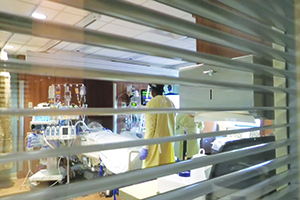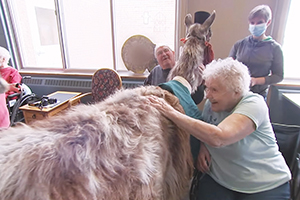By LISA EISENHAUER
In one scene in the documentary "Behind the Mask: Stories of the COVID-19 Pandemic," a nurse at SSM Health DePaul Hospital in suburban St. Louis talks about the toll that caring for patients with the virus has taken on her and her colleagues.

Dr. Stephen Taylor, a critical care physician at SSM Health St. Mary's Hospital in Madison, Wisconsin, stands at the bedside of a patient with COVID-19 who is under his care during a scene from the documentary "Behind the Mask: Stories of the COVID-19 Pandemic." SSM Health made the movie to honor frontline staff, patients and their families.
Her comments come between shots of her in head-to-toe protective garb tending to a patient on a ventilator whose bed is surrounded by electronic monitors and pouches and tubes for intravenous medications.
The nurse, Courtney Aholt, says caring for COVID patients has led to post-traumatic stress disorder and panic attacks. "I've had to seek help for it because of the trauma that we on the front lines have gone through," she says. "It's not only terrifying for these family members and the patients themselves, but for the nurses as well."
SSM Health produced "Behind the Mask" to honor the pandemic experiences of frontline staff like Aholt. It was released in May during Health Care Week.

Residents of Villa Loretto, an assisted living facility in Mount Calvary, Wisconsin, greet a llama in a scene from "Behind the Mask: Stories of the COVID-19 Pandemic." The facility, part of SSM Health-Agnesian HealthCare, was locked down during most of the COVID-19 pandemic. The visit with animals from its farm was one of the first activities at the center once pandemic restrictions began to ease.
Bryan Stevens, a senior editor and producer with SSM Health, directed the film. Stevens said his directive from system executives was to capture the experience of caregivers, patients and families impacted by COVID.
"What we didn't want to make was an SSM Health advertorial," Stevens said. "We wanted it to be watchable by all doctors, all nurses. These just happen to be at SSM facilities, where we had access. We were hoping to make it more universal, so nurses and doctors can see themselves in these people."
He and the film crew spent about six weeks filming in Oklahoma, Wisconsin and Missouri. The locations include hospitals, an assisted living center, private homes and a supply distribution hub. The 37-minute movie was culled from 53 hours of footage.
In addition to doctors and nurses, the movie focuses on patients, family members, an environmental services worker and a supply chain staffer.
Stevens said the first interview the crew did was with a patient named Marland Koomsa at SSM Health St. Anthony Hospital in Oklahoma City. Koomsa is on oxygen but is sitting up and animated as he talks about his bout with COVID.
He says the virus hasn't caused him any pain but has left him struggling to breathe. "I've never been afraid of too much but, boy, this has terrorized my head," he says.
A day after that interview, Koomsa's condition worsened and he was moved to intensive care. Seventeen days later he died. He was 56.
The news of Koomsa's death hit Stevens and his crew hard, even though they had only talked with him briefly. It gave them a feel for the devastating losses that frontline workers have been experiencing for months. The emotions around those losses are so raw that Stevens has been told by some caregivers that they couldn't watch the film.
Despite the tragedies they have gone through and their compassionate response, Stevens said the workers he interviewed shrugged off being called heroes. After seeing what those care providers are enduring in COVID wards, he found the term appropriate. "I just think heroes are people that do this work every day and they just keep coming back," he said.
SSM Health is working on a longer version of "Behind the Mask" that it is considering for film festivals and possible TV distribution. The current version is posted on YouTube and SSM Health is sharing the link on other social media.
Stevens said he tried to be mindful of not making the film too gloomy, despite its heavy subject matter. In addition to scenes inside COVID units, there are scenes at the home of an SSM Health pediatrician who is recovering after a near-fatal bout with the virus. He is in tears as he talks about the support he's gotten in his recovery from his family and colleagues.
Another scene features a recovered patient returning to a hospital to thank the caregivers who saved her. During the joyous reunion, one of the caregivers tells her: "You gave me as much as I gave you, that's for sure."
The movie ends with scenes of workers removing their masks as an original song pays tribute to the resilience of COVID care providers. "We Rise" was written by two SSM Health staffers — John Nguyen, chief marketing officer, and Brad Hood, executive assistant, SSM Health St. Clare Hospital – Fenton, Missouri.
After the credits roll, a final message appears on the screen. It says: "Please vaccinate."